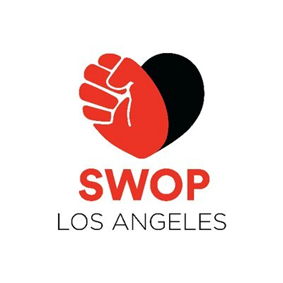The Sex Worker Outreach Project Los Angeles (SWOP LA) is a sex worker-led and sex worker–centered organization that provides crucial harm reduction, community support and mutual aid to current and former sex workers in LA and beyond. We do everything we can to support sex workers, including coordinating street-based outreach, cash aid, community-building events, resource referrals and advocacy. Last year, we even published a zine! Our hope is to not just provide a formal platform for sex workers helping sex workers in Los Angeles, but also to provide a forum for folks to share resources and help foster the informal networks between community members. These connections are especially valuable for those of us working in the often criminalized and highly stigmatized field of sex work.

The SWOP Los Angeles logo, which is in the form of a heart with a red hand making a fist on the left side and a heart in the color black on the right. The text “SWOP LOS ANGELES” is directly under the shape of the heart.
There is no other formal organization in Los Angeles with the same scope and mission as SWOP LA, although there are many other sex workers here who do great work for the cause— both independently and with organizations. As SWOP LA, we have no shortage of dreams and plans for building safety and resources for our community. However, as a completely volunteer-run organization, we are limited by our funding to support the people power and cost of actualizing these visions.
One area we have been focusing on lately, which has serious implications for funders, is monetary mutual aid. When the COVID-19 pandemic began in the spring of 2020, we saw the “adult industry” explicitly barred from accessing government aid like the Paycheck Protection Program and Economic Injury Disaster Loan. Left out of any relief during the pandemic, we, the most vulnerable sex workers, were caught in precarious situations where we were forced to choose between meeting our basic needs and protecting our health. In response, we created our own Emergency Relief Fund, which has to date distributed $20,250 to online applicants and another $5,300 to street-based workers. That said, the major limiting factor to expanding our services is funding.
Sex workers – like many marginalized groups that have been surviving in spite of and not due to formal social supports – know what we need to thrive as a community. Yet, sex workers and organizers so often find themselves having to shape and reword their needs to put together a project that meets the requirements for the funding they desperately need. It is very demoralizing when these proposals get rejected and the precious time that could be spent providing direct services to workers is wasted on another rejected application that won’t address the growing gap in our financial resources to support our community.
One strong and timely example we would like to highlight of how a lack of funding impacts sex workers is in how it displaces us from coordinating our own research into our own lives and communities. We are currently working on a study with a team of academics at an R1 university to understand the effects of a recent bill that decriminalized condom possession on sex workers. This study engages with the sex worker community and has the potential to inform local policy. Community-engaged research is time consuming by nature, and the added barriers of having to adhere to university timelines, IRB protocols and bureaucratic slowdowns hinder the positive impact that the findings of this study could have for the community. Although it’s amazing that this sex worker study was even funded to begin with, it’s hard to not think about how much more efficient this process would be if we were just given the necessary training and funding to do it ourselves. The timelines that the ivory tower imposes onto community organizations like SWOP LA are not conducive to meeting community needs because their goals and ours are not the same. Academic research goals of producing knowledge for knowledge’s sake carry violence that doesn’t honor sex workers and other marginalized communities that are working to produce knowledge that will help us survive.
Academic institutions should continue to fund studies that uplift and directly involve sex workers, but this in itself will not be our main path toward liberation. If universities really want to support sex workers, they can fund us directly so we can lead the research ourselves. Limited funding also means we don’t have the resources to sustain our operations. Our organization is led by members of the sex worker community whose efforts are supported by volunteers and allies.
Our working board consists of 5 members who receive a small monthly stipend to support the work of ensuring continued organizational viability. Some of this work is public-facing, such as organizing general meetings or community events, while other administrative tasks like bookkeeping, grant-writing and website maintenance take place behind the scenes. When all of these duties fall on such a small group of people, it forces all of us to take on many roles, contributing to burnout and limiting our capacity to take on new projects that could benefit the community.
Most non-profits are overworked and underpaid, and we – as a sex worker-led organization – are no exception. Multi-year funding for sex worker–led organizations is essential to us to maintain a sustainable future. Consistent funding creates stability and longevity for the work we do and ensures and improves our services back to the sex worker community that we serve. By having more consistent funding, we are able to see our projects through, ensure current service continuity, fine tune the process and create a system of successorship within our leadership pool.
Having the time to organize is in itself a privilege that can lead to an organization being led by only those who have time to spare if people are not paid. At SWOP LA, it is foundational that our makeup is representative of the community we serve, and having the funding to pay sex workers for our contributions breaks down the systemic barriers that prevent this from happening.

Illustration by Rebeca Soto for Third Wave Fund
By ensuring our survival, we are also able to continually improve our programs and contribute to the well-being of sex workers local to us and across the United States. In addition, multi-year funding is an investment back into the sex worker community. We have found that the more we give to the sex worker community, the stronger we become and the more rapport we build among sex workers as an organization they can trust. By maintaining our presence as providers of services for sex workers in Los Angeles County, the larger we grow. The more sex workers and allies we involve, the more unified we stand in advocating for our safety as sex workers and against the criminalization of our bodies and the work we do.
SWOP LA is dedicated to the safety of sex workers and decriminalization of sex work. The criminalization of sex work keeps all of us down and compromises the safety of those of us working in the sex trade. Currently, our community members do not have equal access to social services, health care and resources to navigate the legal system. We cannot feel free to report violence done against us without fear of potentially being arrested ourselves, losing our housing or having our children taken away. Decriminalization gives workers choice and a voice in this world and allows us to exercise control and autonomy over our own bodies. However, decriminalization is a long-term goal that many in our community simply cannot afford to invest in without financial support. Urgent work like addressing mental health, rent and bail needs often supersedes the important work of advocating for political change. However, not funding decriminalization efforts is extremely short sighted. Without decriminalization, organizations like ours will continually operate in crisis management mode, only ever mitigating the harms of stigma and criminalization. The underlying problems remain unchanged.
Sex workers are integral to this world, and we all have a right to survive and thrive in our community. Through our participation in coalition efforts that resulted in legislative victories like SB233, we have proven to be part of a large and powerful effort to push for the decriminalization of sex work. However, in order to build upon this momentum, we are in a constant state of searching and applying for funding to keep us afloat. This takes away precious time from doing the work itself.
When we reflect with other sex worker organizers, there is a commonly felt sense of the urgency to fight for the laws and policies that bring us closer to liberation. Working toward sex worker liberation is not just a thought experiment we are interested in, it is vital to our survival and the survival of our community. This is not just another side hustle organizing gig for us, it’s our lives and the lives of the people we love at stake.
Members of the SWOP LA Board of Directors — Lucy Khan, Co-Director, Tiffany H., Co-Director, Kim Fuentes, Services and Outreach, and Ashley Madness, Secretary and Fundraiser — wrote this piece together.